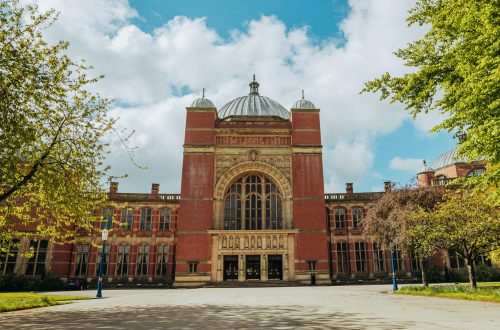
How To Become A University Lecturer
So you want to be a university lecturer? It’s not an easy task, but with the right skills and approach, it’s definitely possible. Let’s take a look at what you need to know.
First, you’ll need to have a high level of academic achievement. This means that you’ll need to have a PhD or a related terminal degree. You’ll also need to have a record of excellent teaching and scholarship.
Next, you’ll need to be able to build relationships with your students. This means being able to engage them in learning, and helping them to develop their academic skills.
You’ll also need to be able to work with other members of the university community, including professors, administrators, and support staff.
Finally, you’ll need to be able to articulate your ideas clearly, both in writing and in speaking.
If you can do all of these things, then you have what it takes to become a university lecturer. Good luck!
Which degree is best for lecturer?
When it comes to choosing a degree to become a lecturer, there are a few different paths you can take. In order to make the best decision for your career, it’s important to understand the different types of lecturer jobs, the skills and qualities that are required for the role, and the different degrees that can lead to a career in lecturing.
There are three main types of lecturer jobs: university lecturer, high school teacher, and primary school teacher. University lecturers are employed by universities to teach undergraduate and postgraduate students. High school teachers are employed by high schools to teach secondary students. Primary school teachers are employed by primary schools to teach students from kindergarten to grade six.
The skills and qualities that are required for a lecturer position vary depending on the level of teaching. However, some of the most essential skills and qualities for all types of lecturer jobs include: excellent communication and interpersonal skills, strong teaching and tutoring skills, the ability to engage and motivate students, strong research and analytical skills, and the ability to develop innovative teaching methods.
There are a variety of degrees that can lead to a career in lecturing. Some of the most common degrees that are required for university lecturer jobs include: a Bachelor of Education, a Bachelor of Arts, a Bachelor of Science, a Bachelor of Commerce, or a Bachelor of Engineering. For high school teacher jobs, a Bachelor of Education or a Bachelor of Arts are the most common degrees, while a Bachelor of Science or a Bachelor of Commerce are the most common degrees for primary school teacher jobs.
So, which degree is best for a career in lecturing? The answer to this question depends on the level of teaching that you want to do and the type of lecturer job that you are interested in. If you want to be a university lecturer, then a Bachelor of Education, a Bachelor of Arts, a Bachelor of Science, a Bachelor of Commerce, or a Bachelor of Engineering are all good options. If you want to be a high school teacher, then a Bachelor of Education or a Bachelor of Arts are the best degrees to pursue. And if you want to be a primary school teacher, then a Bachelor of Science or a Bachelor of Commerce are the best degrees to choose.
Is it hard to become a college lecturer?
There is no one definitive answer to this question. It depends on the individual institution, the field of study, and the level of education desired.
One route to becoming a college lecturer is to first become a professor. This may require a doctorate degree in a specific field, as well as many years of teaching experience at the university level. Once a professor has acquired the necessary qualifications and experience, they may then apply for a position as a lecturer at a college or university.
Another option for becoming a college lecturer is to start out as a high school teacher. A high school teacher may then pursue a master’s degree in education, which could qualify them to teach at the college level.
There are also many online programs that offer college lecturer training. These programs typically require a bachelor’s degree, and may offer specializations in areas such as teaching, curriculum development, and assessment.
So, it is hard to become a college lecturer, but it is not impossible. It depends on the individual’s qualifications and experience.
Is a university lecturer the same as a professor?
There is no one answer to this question as it can depend on the particular institution or country in question. However, in general, a university lecturer is a position below that of professor, and may have different responsibilities and levels of authority in the classroom.
In the United States, for example, a lecturer is generally an instructor who is not tenured or tenure-track. This means that they may not have the same level of job security and may be more easily replaced than a professor. Lecturers may also have fewer opportunities for research and publishing, and may be responsible for teaching more classes than professors.
In contrast, a professor is a more senior position, typically with tenure. They are typically responsible for more research and publishing, and may have more opportunities for teaching and mentoring students. Professors also typically have more job security and a higher salary.
How do you get hired as a lecturer?
So you want to be a lecturer? It’s not an easy job to land, but with the right strategy, you can be on your way to a career in academia.
First, you need to understand what a lecturer is. A lecturer is a teacher who is not a professor. Professors are typically tenured, meaning they have a permanent job and cannot be fired. Lecturers are typically hired on a contract basis and can be fired at any time.
Lecturers typically teach undergraduate courses, although they may also teach graduate courses. They are usually responsible for preparing lectures and for grading assignments and exams. They also usually do some research, although it is not usually as extensive as the research done by professors.
So how do you become a lecturer? The best way to get hired as a lecturer is to get a PhD in a relevant field. Once you have your PhD, you can apply for lecturer positions at universities around the world.
There are also other ways to become a lecturer. Some universities hire people with only a master’s degree. Others hire people with only a bachelor’s degree. And some universities hire people who are not even teachers.
If you are not a PhD holder, your best bet is to apply for positions at universities that are looking for people with only a master’s or a bachelor’s degree. There are also websites that list lecturer positions. Check out websites like Academic Jobs Online and Higher Education Recruitment Consortium.
To increase your chances of getting hired as a lecturer, make sure your CV and cover letter are well written and that you have excellent references. You should also have teaching experience.
It’s not easy to become a lecturer, but with the right strategy, you can make it happen. Good luck!
How do I become a lecturer in USA?
The process of becoming a lecturer in the USA varies depending on the level of education desired and the type of institution. For those seeking to become a lecturer at a university, a doctorate is often required. Alternatively, for those seeking to become a lecturer at a community college or other institution, a master’s degree may be suffice.
The first step in becoming a lecturer in the USA is to determine the level of education desired and the corresponding qualifications. For those seeking to become a lecturer at a university, a doctorate is often required. The doctorate can be in any field, but most universities prefer candidates who have a degree in the field they would be teaching. The doctorate can be in any field, but most universities prefer candidates who have a degree in the field they would be teaching.
The second step is to find a position that is a good fit. There are a variety of ways to do this. One way is to search the websites of universities in the USA and look for open positions. Another way is to contact the department of education at universities and ask for a list of open positions. Finally, one can also contact professional organizations, such as the American Association for University Professors (AAUP), and inquire about open positions.
The third step is to apply for the position. This generally involves submitting a resume, cover letter, and transcripts. The cover letter should explain why the applicant is interested in the position and why they are a good fit. The transcripts should show that the applicant has the qualifications required for the position.
The fourth step is the interview process. If the applicant is selected for an interview, they will likely be asked to give a presentation or teach a class. The interview will also include questions about the applicant’s qualifications and experience.
The fifth step is the offer process. If the applicant is offered the position, they will need to accept or decline the offer. If the offer is accepted, the next step is to start working.
Which course is best for lecturer?
Choosing a course to become a lecturer can be a daunting task. There are many different paths that you can take, and it can be hard to know which one is the best for you. Here is a breakdown of some of the most popular courses that can lead to a career as a lecturer.
One of the most popular courses is to become a teacher. This is a great option if you want to work with students and help them learn. Teachers typically have to complete a bachelor’s degree in education, and they may also need to complete a teacher certification program.
Another popular option is to become a professor. Professors typically have to complete a doctoral degree in a field related to the subject they will be teaching. They may also have to complete a teaching certification program.
If you are interested in becoming a lecturer, but you do not want to become a teacher or professor, there are other options available to you. You could become a corporate trainer, which involves teaching employees new skills to help them be more successful in their jobs. Corporate trainers typically have to complete a bachelor’s degree in a field related to the skills they will be teaching.
Another option is to become a curriculum developer. Curriculum developers create educational materials such as textbooks and worksheets. They typically have a bachelor’s degree in a field related to the subject they are teaching.
The best course of action for becoming a lecturer is to research the different options and find the one that is the best fit for you. Talk to people who are already in the field to get their advice, and read up on the different requirements for each course. With a little bit of research, you can find the right course to help you achieve your dream of becoming a lecturer.
Which bachelor degree is best for lecturer?
There are a variety of bachelor degrees that can lead to a career as a lecturer. Which one is best for you depends on your personal interests and career goals.
One option is to earn a Bachelor of Arts in Liberal Arts. This degree can prepare you for a career in teaching by providing you with a strong foundation in humanities and social sciences. It also allows you to specialize in a subject area, such as English or history.
Another option is to earn a Bachelor of Science in Education. This degree can provide you with the necessary teaching credentials and prepare you to work in a variety of educational settings. It covers subjects such as curriculum development, assessment, and teaching methods.
If you are interested in pursuing a career in academia, you may want to consider earning a PhD in a subject area related to your field of interest. A PhD can prepare you for a career as a university professor or research scientist.
Ultimately, the best bachelor degree for lecturer depends on your personal interests and career goals. Consider your options and talk to a career counselor to help you decide which degree is best for you.
What is the best degree for professor?
A professor is a highly educated individual who typically teaches at a university or college. Professors may have a variety of degrees, but the best degree for professor is a Ph.D.
A Ph.D. is the highest degree you can earn in most fields. It stands for Doctor of Philosophy, and it is a research-based degree that prepares you for a career in academia. To become a professor, you usually need to have a Ph.D. in the subject you want to teach.
There are other degrees that can also lead to a career in academia, such as a Master of Arts or Master of Science. However, these degrees are not as research-based as a Ph.D., so they may not be as suitable for professors.
If you want to become a professor, it is important to choose a degree that will allow you to do research and learn about your subject. A Ph.D. is the best degree for professor, but other research-based degrees, such as a Master of Science or a Doctor of Psychology, may also be suitable.
Do lecturers need PhD?
There is no one definitive answer to the question of whether or not lecturers need PhDs. The answer may depend on the particular discipline being taught, the level of instruction, and the institutional context.
Some argue that PhDs are not necessary for university lecturing positions, and that experienced professionals without PhDs can be successful teachers. Others contend that having a PhD is crucial for university teaching, as it demonstrates a level of expertise and mastery of the subject matter.
There is evidence that both sides have a point. Some studies show that PhD holders tend to be more successful as university lecturers than those without PhDs. However, there are also cases of highly successful university lecturers who do not have PhDs.
Ultimately, the decision of whether or not to obtain a PhD depends on the individual and their specific goals and circumstances. Some people may find that a PhD is necessary for their desired career path, while others may find that other qualifications or experience are more important.
What is the difference between a lecturer and a professor?
A lecturer and a professor are both educators, but there are some key distinctions between the two roles.
A lecturer is typically an educator who is hired to give instruction on a specific subject, while a professor is typically a more senior educator who is responsible for teaching, researching, and guiding students.
Lecturers are often hired on a temporary or part-time basis, while professors are typically hired on a permanent basis. Professors may also have the title of “associate professor” or “full professor.”
Lecturers typically have a lower level of education than professors. Lecturers typically have a master’s degree or doctorate, while professors typically have a doctoral degree.
Lecturers are typically paid less than professors.
Can you call a lecturer professor?
There is no definitive answer to this question as it depends on the individual lecturer’s preference. Some professors prefer to be called by their title, Professor, while others are happy to be called by their first name. Ultimately, it is up to the individual professor to decide how they would like to be addressed.
What is a lecturer in a university?
A lecturer is an academic who is employed to deliver lectures at a university. They are responsible for teaching undergraduate and postgraduate students, and may also be involved in research.
Lecturers typically have a PhD or a related postgraduate qualification, and may also have teaching experience. They may be based in a department, or may be employed across a number of departments.
Lecturers are typically paid a salary, and may also receive additional payments for teaching hours. They may also be eligible for benefits such as holiday pay and sick leave.
What title do you call a lecturer?
A lecturer is a person who teaches in a university or other institution of higher education. They are usually known as a professor in the United States.



